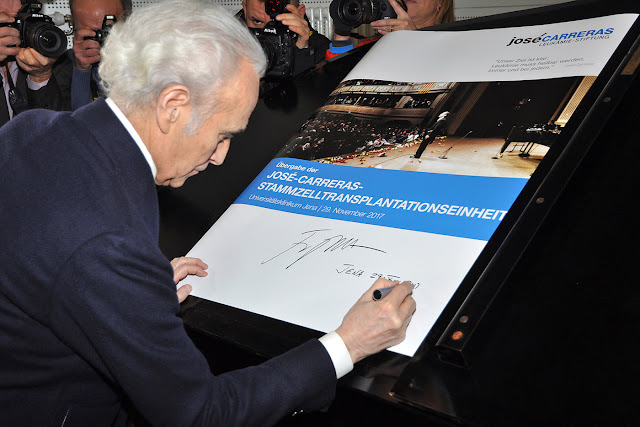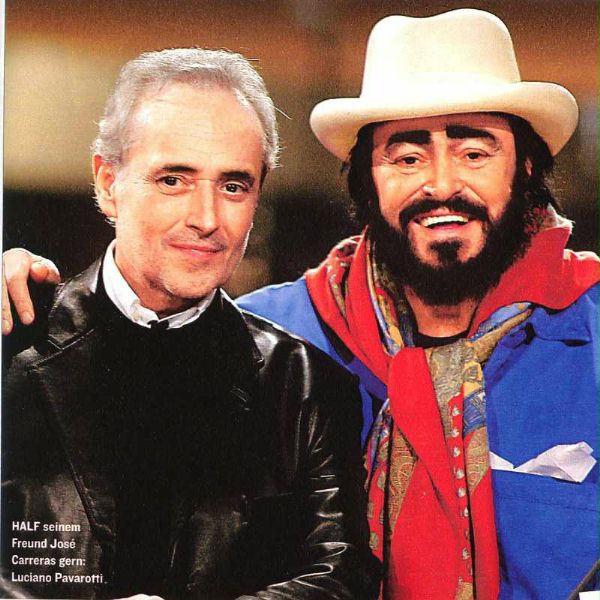25 years ago today Josep Carreras underwent his bone marrow transplant: slowly back to life!!
Ogni anno non ho mai mancato di ricordare una ricorrenza di tanta importanza vitale, in tutti i sensi, tanto meno potrei farlo quando si tratta di un anniversario così rotondo come il 25esimo: 25 anni fa, infatti, il 16 di Novembre del 1987, Josep Carreras si sottoponeva ad un autotrapianto di midollo osseo presso il Fred Hutchinson Cancer Research Center di Seattle, in seguito alla terribile diagnosi di leucemia acuta che, nel suo caso, no gli dava una speranza di sopravvivenza superiore al 10%. Era l'unica via possibile per non poter disporre di un donatore compatibile tra i familiari, nonostante la buon esito non fosse affatto garantito.
L'equipe medica del Fred Hutchinson realizzò il prelievo del midollo da depurare, sotto la guida del suo direttore, Dr. Edward Donnall Thomas, allora futuro Premio Nobel per la Medicina, scomparso recentemente all'età di 92 anni: un processo estremamente doloroso, soprattutto al cessare dell'effetto dell'anestesia epidurale, nell'attesa di quello che era chiamato "day zero", ovvero quello in cui era prevista la re-iniezione del midollo ormai libero da ogni traccia di neoplasia.
Josep Carreras between Professors Ciril Rozman and Donnall Thomas. Above, the rest of the equipe: Dr. Grañena, Dr. Buckner, and Dr. Permanyer. Vienna, 1988.
Prima di accertarsi dell'esito dell'autotrapianto è stato necessario trascorrere varie settimane nel silenzio di una camera sterile, dove la speranza si alternava al tormento dell'eventualità di non poter veder crescere i propri figli o dell'impossibilità di poter tornare su un palcoscenico, nella peggiore delle ipotesi. La colonna sonora della sua degenza a Seattle, come ben saprete, fu il Concerto no.2 per Piano e Orchestra di Rachmaninov: questa musica, più di altre l'ha aiutato, accompagnato, gli ha dato la forza di superare i momenti più critici, offrendogli una sensazione per cui si sentisse protetto durante l'ascolto. Josep Carreras ha scritto nel suo libro di memorie "A Viva Voz" che tutt'ora ama ascoltarlo nei momenti complicati della sua vita. Per questo motivo, non posso esimermi dal riproporvelo anche oggi, in tutta l'intensità dell'interpretazione del grande Lang Lang, con la speranza che questo ascolto così speciale possa infondere forza a chi ne senta il bisogno.
Nonostante per Josep Carreras non fossero ancora esaurite complicazioni talvolta drammatiche come l'improvviso cessare della riproduzione di globuli sanguigni da parte del suo midollo, miracolosamente risolta con l'amministrazione della molecola GMC-SF, all'epoca ancora in fase sperimentale, oppure l'insorgere di tre piccoli polipi nell'esofago, quel "day zero", ovvero il 16 di Novembre del 1987, ha segnato l'inizio di un processo che, seppur tortuoso, gli stava gradualmente restituendo la vita. E non l'avrebbe restituita solo a lui, ma avrebbe contribuito a renderla a moltissimi pazienti affetti dalla stessa patologia per opera della Fundació Josep Carreras per la lotta contro la Leucemia, sorta nell'estate del 1988 per volontà del tenore e della sua famiglia, con obiettivo ultimo l'assoluta curabilità della leucemia e delle altre malattie del sangue.
Josep Carreras and a little patient. Berlin 2008.
Alla luce di quanto ne ha conseguito, l'importanza di questa data è particolarmente significativa ed emozionante: Carreras in un'occasione l'ha definita una sorta di "secondo compleanno", forse addirittura più rilevante del primo. Per questo motivo, anche quest'anno, il nostro ricordo si stringe attorno a Josep per augurargli di cuore un felice 25esimo anniversario!!
Moltíssimes felicitats Josep!!
Key facts:
◦ Every year, it's important to me to mention a recurrence of such vital importance, in all sense, and more especially I can't avoid doing it this year as the anniversary is exactly the 25th: 25 years ago, in fact, on November 16, 1987, Josep Carreras underwent an autologous bone marrow transplant at the Fred Hutchinson Cancer Research Center in Seattle, that followed the terrible diagnosis of acute leukemia which, in his case, gave him no more hope of survival than 10%. It was the only way as he didn't have a compatible donor among family members, despite the success was not guaranteed at all.
The medical team of the Fred Hutchinson carried out the withdrawal of the bone marrow to be treated, under the leadership of its director, Dr. Edward Donnall Thomas, the future Nobel Prize for Medicine in 1990, who recently died at the age of 92: it was an extremely painful proces,s especially each time the effect of epidural anesthesia ceased, waiting for the so-called "day zero", when the bone marrow free from any trace of cancer was supposed to be re-injected.
Before he could knew whether the transplant had been successful it was necessary to spend several weeks in the silence of a sterile room, where hope alternated to torture of the possibility of not being able to see his children growing, or the impossibility to go back on stage, in the worst case.
◦ The soundtrack of his stay in Seattle, as you well know, was the Concerto No.2 for Piano and Orchestra by Rachmaninov: this music, more than any other, helped him a lot, gave him the strength to overcome the most critical moments, making him feel secure while listening to it. Josep Carreras wrote in his memoir "A Viva Voz" that still loves to listen to it when times are troubled.
For this reason, I can not help bringing it here even today, with the intensity of the interpretation of the great pianist Lang Lang, also hoping that it will give strenght to those who need it.
◦ Although for Josep Carreras was still to face further complications sometimes dramatic like the sudden cessation of reproduction of blood cells from his bone marow (miraculously solved with the administration of the molecule GMC-SF, then still in the experimental stage), or the occurrence of three small polyps in his esophagus, the "day zero", November 16, 1987, marked the beginning of a process which, though tortuous, would gradually give him life back. And not only to him, but also to lots of patients with the same disease through the work of the Josep Carreras Leukaemia Foundation, established in summer of 1988 by the will of the tenor and his family, with the ultimate goal of absolute curability of leukemia and other blood diseases.
◦ In light of what followed, the importance of this date is so significant and exciting that Carreras has defined it a kind of "second birthday", perhaps even more important than the first. For this reason, this year, our memory gather around Josep to wish him, with all our heart, a happy 25th second birthday!!





Comments
Post a Comment
Recent comments